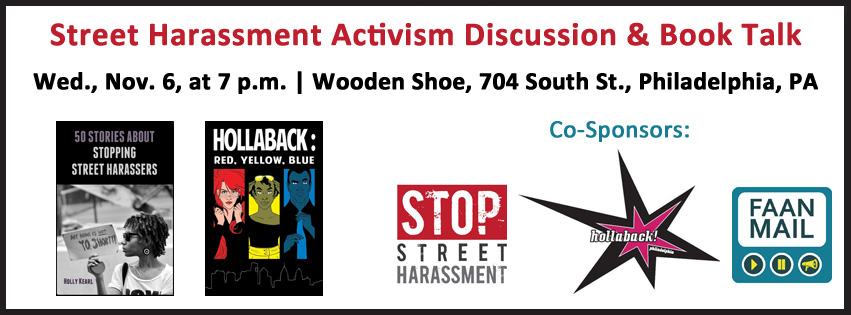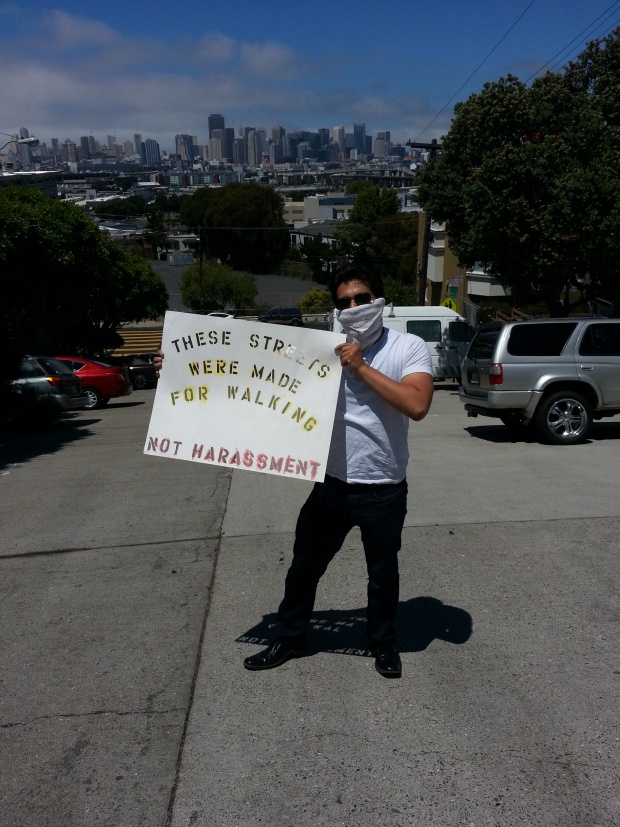Check out these new anti-harassment campaigns, from Canada to the UK to the USA.
1. A campaign to address harassment on Translink in Vancouver, Canada

“Katie Nordgren and her Simon Fraser University classmate Alexa Dredge launched a website to share stories of harassment from public-transit riders across Metro Vancouver. For now, Harassment on TransLink is a project for their third-year gender, sexuality, and women’s studies course, but Nordgren hopes its scope will grow beyond that.
According to Nordgren, the site received more than a dozen submissions in its first day, and stories of “aggressive” and “scary” behaviour continue to come in to translink.harassment@gmail.com. In one post, a woman—who is anonymous, like all of the site’s contributors—recalls a man, with his hands in his pants, telling her he wanted to “shove it” in her butt on the SeaBus. Another woman wrote that she was harassed on the SkyTrain by two men who said she wanted to “fall all over their dicks” and then joked about shooting her in the head….
Metro Vancouver Transit Police has heard stories like those posted on Harassment on TransLink, according to spokesperson Anne Drennan. She told the Straight that transit police take sexual harassment and assaults “extremely seriously”, but they’re concerned that many people aren’t reporting incidents to them.
“It’s great to see people being encouraged to tell their stories,” Drennan said by phone from New Westminster. “That’s cathartic, right? But we want them to tell us.”
2. New student campaigns in England aim to combat sexual harassment and assault in night clubs
“The Sheffield Anti-Sexual Harassment (SASH) is campaigning for clubs to hang posters on their walls to raise awareness. It is also asking them to train their bouncers and staff to spot and deal with harassment…. SASH wants to put a list of clubs online that are believed to be “safe spaces” for women. It plans to talk to student societies to make sure that they are not collaborating with clubs that are unsafe. The group hopes that the commercial incentive to get on to the approved list will encourage bars to work with it…
Students in Leeds are also demanding change. There, the feminist society and student paper are running a campaign to get the club night that hosted ‘Fresher’s Violation’ – where female staff “have what is meant to look like semen on their trousers” – closed down. Their online petition has reached over 3,500 signatures, at the time of writing, and has attracted attention from police and the local council. In addition to this, Leeds Femsoc want to persuade clubs around Leeds to sign a pledge against sexual harassment….
Students in Bristol have used Facebook to draw attention to the problem, creating a page called ‘Spotted: Sexism at Bristol‘, where students can name and shame those involved. “One post showed a young girl in a club who had passed out,” says Alice Philips, women’s officer at Bristol University. “Instead of helping her, four boys took pictures up her skirt.” She adds: “We want to show people that this is happening. It’s dangerous for people to say there’s nothing wrong and everything’s alright. We are giving women a voice and enabling them to shout back.”
3. A new Safe Sites effort in Massachusetts led by the Coalition for the Prevention of Domestic Abuse and the North Shore Rape Crisis Center
“Participating businesses will display a Safe Sites decal in their windows to indicate that help is available, if needed [for people facing street harassment, sexual assault, or other forms of violence]. Safe Sites are provided with basic written information about emergency services and local resources to share with anyone seeking assistance. They may also offer use of their phones and allow someone feeling threatened to remain in their business until help arrives. Safe Sites is modeled after the successful Safe Streets program of the Arizona Center against Sexual Assault and is also being implemented in other North Shore communities by the YWCA North Shore Rape Crisis Center.


